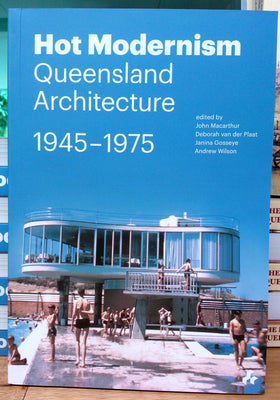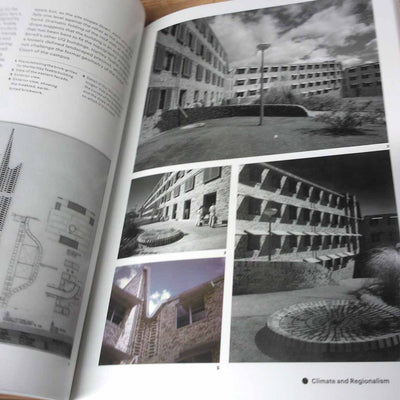Hot Modernism Queensland Architecture 1945 – 1975
John (ed) MacarthurThis thematic presentation of the history of modernist architecture of Queensland, Australia provides a fascinating case of the interrelation of climatic design and an aspiration for distinct cultural identity for a region. As international modernism swept the world after the Second World War it confronted differing landscapes, climates, and building traditions. The case of Queensland is exemplary in this regard. Queensland provided the challenge of heat and humidity that the theorists of modernism expected would be a scientific rationale from which regional variations of the movement would grow as Western progressive architecture was taken up in the developing world. But Queensland was a relatively wealthy society with a sophisticated architectural culture and a well established discourse on the climatic determination of building form that had already given it a distinct regional identity.
Hot Modernism is a thematic history that traces the conflicts and felicities that occurred as international modernism met a strongly developed regional cultural identity.
In nine essays written by a group of international scholars and organised into four thematic sections (Foundations: Modernism and its Critique; Influences; People, Firms & Networks and Building Programmes), Hot Modernism highlights the foundation and growth of modern architecture in queensland, as well as issues that are common to post-war architecture internationally, such as urban form and transport, art and education, civic pride and the rediscovery of history. The regional flowerings of mid-twentieth century modernism in Europe and the Americas have in recent years been meticulously dissected and widely published, and <em>Hot Modernism</em> contributes to the emerging understanding that modernism, despite its internationalism, was not a monolithic cultural movement, nor one that can be understood at a national level. The vastness of the Australian continent, along with its rich climatic, geographic and cultural diversity, necessitates a more nuanced, place-based approach. Hot Modernism zooms into this finer grain as it investigates and expounds the idiosyncratic, regional building practice that emerged in queensland in the decades following the Second World War. Based on substantial oral history and archival research, this publication offers engaging first-hand accounts and vivid illustrations of significant buildings and their under-acknowledged designers.



